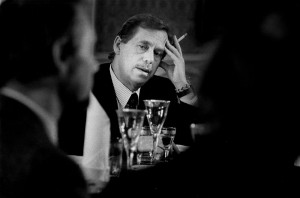[F]rankly, when I began commenting on the deaths of famous people four years ago, the last thing I wanted was to contribute to our culture’s perverse fascination with celebrities. In fact, I only began this feature as a lark to propagate the superstition that the deaths of famous people come in threes.
(Post mortem on deaths of famous people commentaries, The iPINIONS Journal, June 4, 2010)
 Consistent with the above, I commented on Monday on the death of Christopher Hitchens and on Tuesday on the death of Kim Jong-il. Now here I am feeling obliged for a third-consecutive day to comment on the death of another famous person, Václav Havel.
Consistent with the above, I commented on Monday on the death of Christopher Hitchens and on Tuesday on the death of Kim Jong-il. Now here I am feeling obliged for a third-consecutive day to comment on the death of another famous person, Václav Havel.
Of course, who constitutes a famous person these days is such that I use the term advisedly. For even though Havel embodied the Velvet Revolution that brought about the demise of Communist rule – not just in his native Czechoslovakia but throughout the entire Soviet Union, chances are that many of you know far more about Snooki than you do about him.
In any case, suffice it to know that I am paying this modest tribute because Václav Havel is to the demise of Communism in Czechoslovakia what Nelson Mandela is to the demise of Apartheid in South Africa. And that’s saying a lot.
Indeed, here is how historian Timothy Garton Ash remarked on the driving force Havel was in Civic Forum, the dissident group that drafted the proclamations and plotted the strategy that ended Communist rule:
It was extraordinary the degree to which everything ultimately revolved around this one man.
(New York Times, December 20, 2011)
Like Mandela, Havel was persecuted and jailed for championing the universal principles of freedom and democracy – with emphasis on freedom of expression and human rights. Like Mandela, he persevered to become his country’s first democratically elected president. And like Mandela, he exuded a moral authority throughout his public life that compelled comparisons to historic figures like Martin Luther King Jr, Mahatma Gandhi, and Jesus Christ himself. (Never mind that he had more in common with Bill Clinton when it came to marital fidelity; although, MLK was a womanizer too. But I digress….)
What I find so appealing about Havel is that he was by all accounts a painfully shy man. Which meant that, unlike Mandela, his influence had little to do with the inspiring and irresistible force of his personality. Instead it had everything to do with the way he empowered the powerless through his words, which he expressed in an impressive anthology of plays and essays and, most significantly, in his Charter 77 human rights manifesto.
Actually, think for a moment about how the words attributed to Jesus in the New Testament inspires Christian missionaries and you’ll get a sense of how Havel’s words inspired Czechs and others who were living behind the Iron Curtain. I wrote of Hitchens that his commentaries on the fatwa against Salman Rushdie proved that the pen is indeed mightier than the sword. Well Havel proved that a thousand times more with his writings.
All the same, I’m embarrassed to admit that, while I was actively involved in anti-Apartheid demonstrations during the 1980s, I paid little attention to, let alone marched in solidarity with, anti-Communist demonstrations. No doubt this is why I was not nearly as moved when Communism ended in Czechoslovakia in 1989 as I was when Apartheid ended in South Africa in 1994.
Havel, like Christopher Hitchens, was a heavy smoker. He died from the acute respiratory problems he had been suffering since last spring. He is survived by his wife, Dagmar. He was 75.
Farewell, Václav.
Related commentaries:
Post mortem on deaths…